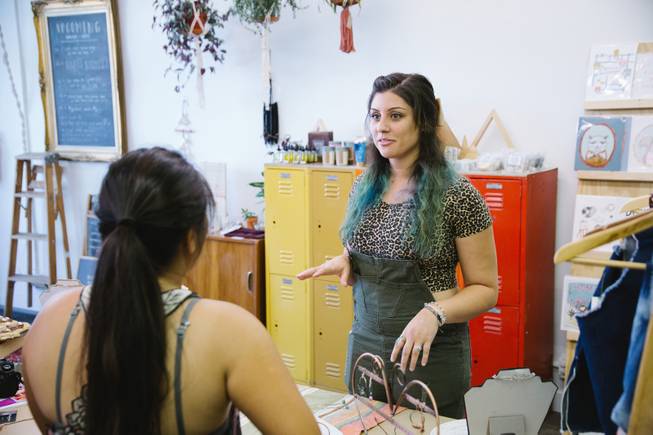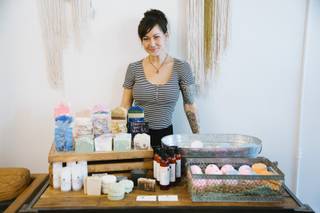
Wade Vandervort
Shayanne Nelson of Bleu Moon Bakery talks with a shopper during the Maker’s Market event at Sister House Collective in downtown Las Vegas, Saturday, July 15, 2017.
Sunday, July 23, 2017 | 2 a.m.
Did you know?
Compared with just 15 years ago, the average person buys 60 percent more items and keeps them half as long.
From the outside, Sister House Collective looks like a standard gift shop. One step inside and you know it’s bringing something unique to the block: handmade goods that have a positive impact, locally and globally.
Now situated between trendy boutiques and street art just before Fremont East, Sister House began in 2014 as a pop-up shop. Ashley Ayala opened her storefront in April, a shrine to the idea of “intentional community.” In her travels around the world, Ayala witnessed exploitation and unjust treatment, and it pushed her to create a retail space that would be a platform for fair trade. That means sustainably sourced products made by artisans who are treated well and compensated fairly. When drafting the business model, she saw Sister House as a hub where the Las Vegas community could grow and learn, foster authentic relationships and empower meaningful service.
“Each item has a story to tell,” she says. “For our global goods, the story is often one of hope: Women are being given an economic opportunity to thrive in their home communities. They are earning reasonable income in a dignified profession and, often, they are overcoming a cultural or circumstantial disadvantage.”
What is Fair Trade?
FAST FACTS
• The textile industry employs more than 75 million people, and roughly 80 percent are women between the ages of 18 and 35.
• Only 2-5 percent of clothing products are made in the U.S., as wage and living standards don’t support the prices consumers demand.
When a product is certified as “fair trade,” it’s an assurance that respect was shown to the maker and the planet during its creation. To earn the designation, it must meet certain social, environmental and economic standards, offering the creator a living wage (not just a minimum wage), so he or she can prosper. It’s the opposite of how most of us consume, known as “fast fashion.” It references how quickly clothing moves from the catwalk to the consumer to the curb, the cheap goods requiring manufacturing practices that push workers too hard and pollute the environments of developing countries, and create a massive amount of textile waste.
Why shop Sister House?
Shopping is usually about trying to score a deal. But Ayala wants people to invest in quality, ethically made pieces instead of an abundance of items not built to last. Her goal is to get consumers asking, “Who made this?”
At Sister House, the answer might point to someone down the street, or someone in the Philippines, Kenya, Thailand, Madagascar or Bangladesh.
“Buying their products here, or anywhere that sells their goods, enables them to earn a respectable living and wage, which is often rare in the areas they live in,” Ayala said of less developed places. “Local makers also are being affected in a big way when their goods are sold at our shop. They are connecting with the people who are buying their products, whether in person, directly, or through social media afterward. We have to remember that we all, as consumers, hold a lot of power for local businesses.”
Know your clothing’s origin
Walking around the shop, you’ll see info cards on where and how products were made, often with details about the artists and social impacts. Below, we’ve highlighted some products from artisans both local and abroad you can find on the shelves.
• Anisa Kelso, Green Stitch Fabrics: Designer and fair-trade advocate Kelso makes clothes ethically and embellishes with beautiful dyes and patterns.
• Good Paper: Clever puns are artfully rendered on these uplifting cards, each one signed by a creator who escaped sex trafficking or was orphaned by disease in Rwanda. The work provides them solid employment and hope.
• Emma Kelly, Desert Daisy Jewelry: Engineer-turned-designer Kelly’s gems are ethically sourced from her travels to India and crafted into unique jewelry pieces.
• Krochet Kids: This clothing company operating in Uganda and Peru helps women escape poverty and receive training. Sister House sells its shirts and accessories, all signed by makers.
• Audrey Hale, Roux & Bones: Wife, mom and girl boss, Hale creates all-natural soaps, bath bombs and skin-care products.
• Conscious Coconut: Coconut oil is a trendy way to treat your skin and hair, and this product comes from fair-trade farms in Thailand and the Philippines. For each purchase, the company gives a meal to a child through Feeding America Food Banks.


Join the Discussion:
Check this out for a full explanation of our conversion to the LiveFyre commenting system and instructions on how to sign up for an account.
Full comments policy